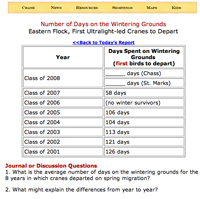Today's Report Includes:
- Just Three Juveniles Still in Florida >>
- News: Reports
and Photos From the Field >>
Lesson: Signals from the Sky: About Those PTTs
- Journal Topic: Number of Days on the Wintering Grounds >>
- More Endangered Species Math: How Many Left? >>
- Photo Story: Contest for the Female >>
-
Links: This Week's Crane Resources >>
Photo
Sara Zimorski
Tracking the group of four that left Chass, Eva got to their Illinois location April 1. She found that this crane had separated from the others. Which crane? Use the band colors to identify. |
Rising up and catching their first thermal, juveniles 805, 812, 813, 826, 828, 829 and 830 left St. Marks together on March 30! Trackers got a PTT reading from #813 in Alabama on March 31. Is the whole group still together? Trackers think so, and are racing to catch up with them to see. Still at the Chass release site in Florida are three juveniles: #803, 824, and 827.
 |
March 30, 2009 Hear
Bev (with a bad cold) describe the magnificent departure of
the "St.
Marks 7" on
their first journey north. >> |
|
Enjoy video of first family to leave Texas, on their March 28 migration stopover! |

|
|
|
Western
Flock News>> |
46
Whooping cranes from the Eastern flock are back in Wisconsin! Their
migration is way ahead of the larger Western Flock. (It's
still too cold to arrive in
Canada.) |
Eastern
Flock News>> |
Four of the "Chass 7" began migration March 24. The St. Marks 7 all departed together March 30.
- How many days did the four departed cranes spend on the wintering grounds at Chassahowitzka NWR? (They arrived Jan. 23, 2009.)
- How many days did the "St. Marks 7" spend on the wintering grounds at St. Marks NWR? (They arrived Jan. 17, 2009.)
- In the flock's 8-year history, how do these two wintering times compare with other first cranes to depart on spring migration? See Chart >> and answer the questions at the bottom of the chart.
Write your
responses in your Journal. >>
Watching over the last remaining wild migratory flock of Whooping cranes in Texas, Tom Stehn has told us that 2008-2009 was the worst winter on record in terms of bird deaths for this flock. He estimates 21 cranes died at Aransas NWR this winter. The combination of mortality at Aransas and the losses during spring, summer and fall resulted in approximately 21 percent of the Central Flyway flock being lost in the last 12 months.
- If 270 arrived, how many might we expect to come north this spring?
 |
 |
 |
But soon she had another boyfriend: #310. Photos Richard Urbanek, ICF |
Last
April W601 (with #310) made her first nest! She was still too
young to lay eggs, but it was good practice. #310 was still
with
her
when they
migrated home in March. |
What next? In the meantime, male #307 is also back on Necedah NWR. Sara Zimorski told us, "Apparently #307 has been trying (and may have succeeded) to steal W601 away from #310. Last year #307 and W601 were hanging out together before #310 came along so we'll see what happens." (Female #721 was #307's unofficial mate last summer. She migrated with him last fall, but she was found dead in Putnam County, Florida on January 3, 2009.) What do you think will happen next?
- Audio Clip: Bev Describes the Chass 7's Spring Departure >>
- Video Clip: Whooper Family at Migration Stopover >> (Joel Jorgensen, Nongame Bird Program Manager at NE Game and Parks Commission)
- Lesson: Signals From the Sky: About Those PTTs >>
- Math: Number of Days on the Wintering Grounds >>
- Graph >>
- Identify Using Band Colors: Quick Color Codes for the Class of 2008 >>
- Mapping and Record Keeping: Track the Migration >>
- Meet
Student Craniacs: Classrooms in Action >>
The Next Whooping Crane Migration Update Will Be Posted on April 10, 2009.







